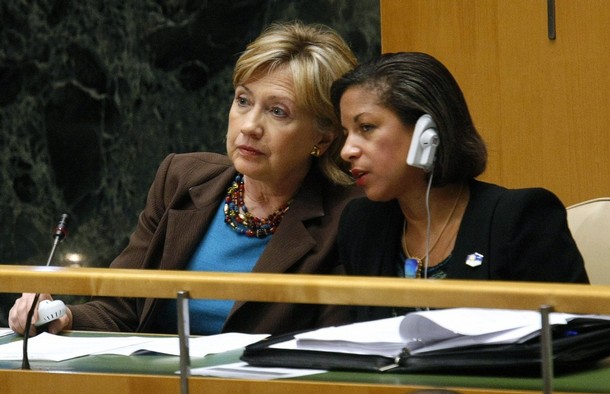
From Helene Cooper and Steven Lee Myers, the New York Times: In a Paris hotel room on Monday night, Secretary of State Hillary Rodham Clinton found herself juggling the inconsistencies of American foreign policy in a turbulent Middle East. She criticized the foreign minister of the United Arab Emirates for sending troops to quash protests in Bahrain even as she pressed him to send planes to intervene in Libya.
Only the day before, Mrs. Clinton — along with her boss, President [Barack] Obama — was a skeptic on whether the United States should take military action in Libya. But that night, with Col. Muammar el-Qaddafi’s forces turning back the rebellion that threatened his rule, Mrs. Clinton changed course, forming an unlikely alliance with a handful of top administration aides who had been arguing for intervention.
Within hours, Mrs. Clinton and the aides had convinced Mr. Obama that the United States had to act, and the president ordered up military plans, which Adm. Mike Mullen, chairman of the Joint Chiefs of Staff, hand-delivered to the White House the next day. On Thursday, during an hour-and-a -half meeting, Mr. Obama signed off on allowing American pilots to join Europeans and Arabs in military strikes against the Libyan government.
The president had a caveat, though. The American involvement in military action in Libya should be limited — no ground troops — and finite. “Days, not weeks,” a senior White House official recalled him saying.
The shift in the administration’s position — from strong words against Libya to action — was forced largely by the events beyond its control: the crumbling of the uprising raised the prospect that Colonel Qaddafi would remain in power to kill “many thousands,” as Mr. Obama said at the White House on Friday.
The change became possible, though, only after Mrs. Clinton joined Samantha Power, a senior aide at the National Security Council, and Susan Rice, Mr. Obama’s ambassador to the United Nations, who had been pressing the case for military action, according to senior administration officials speaking only on condition of anonymity. Ms. Power is a former journalist and human rights advocate; Ms. Rice was an Africa adviser to President [Bill] Clinton when the United States failed to intervene to stop the Rwanda genocide, which Mr. Clinton has called his biggest regret.
Now, the three women were pushing for American intervention to stop a looming humanitarian catastrophe in Libya. …
In joining Ms. Rice and Ms. Power, Mrs. Clinton made an unusual break with Secretary of Defense Robert M. Gates, who, along with the national security adviser, Thomas E. Donilon, and the counterterrorism chief, John O. Brennan, had urged caution. Libya was not vital to American national security interests, the men argued, and Mr. Brennan worried that the Libyan rebels remained largely unknown to American officials, and could have ties to Al Qaeda. …
“Hillary and Susan Rice were key parts of this story because Hillary got the Arab buy-in and Susan worked the U.N. to get a 10-to-5 vote, which is no easy thing,” said Brian Katulis, a national security expert with the Center for American Progress, a liberal group with close ties to the administration. This “puts the United States in a much stronger position because they’ve got the international support that makes this more like the 1991 gulf war than the 2003 Iraq war.” (photo: Reuters)
Image: reuters%203%2019%2011%20Hillary%20Clinton%20Susan%20Rice.jpg
